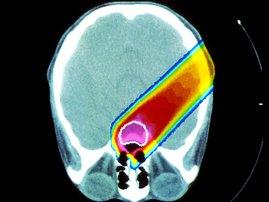
July 29, 2010 - Patients with deadly glioblastomas who received high doses of radiation on a portion of the brain that harbors neural stem cells had double the progression-free survival time as patients who had lower doses or no radiation targeting the area, a study from the Radiation Oncology Department at UCLA’s Jonsson Comprehensive Cancer Center has found.
Patients who underwent high doses of radiation that hit the stem cell niche experienced 15 months of progression-free survival, while patients receiving lower or no doses to this region experienced 7.2 months of progression-free survival, said Frank Pajonk, M.D., an associate professor of radiation oncology, a cancer center researcher and senior author of the study.
Pajonk said the study, published today in the early online edition of the journal BMC Cancer, could result in changes in the way radiation therapy is given to patients with these deadly brain cancers.
“Our study found that if you irradiated a part of the brain that was not necessarily part of the tumor the patients did better,” Pajonk said. “We have been struggling for years to come up with new combinations of drugs and targeted therapies that would improve survival for patients with glioblastoma. It may be that by re-shaping our radiation techniques we can extend survival for these patients.”
The retrospective study focused on the cases of 55 adult patients with grade three or grade four glioblastomas who received radiation at UCLA between February 2003 and May 2009. Pajonk said a prospective study is needed to confirm the results.
There is some evidence that many if not all cancers may spring from stem cells or progenitor cells that normally repair damage to the body, but that somehow become mutated and transform into cancer. In this case, Pajonk said the neural stem cell niche, called the periventricular region of the brain, may also be harboring stem cells that have transformed into brain cancer stem cells. However, the niche serves as a sort of safe harbor for the cancer stem cells, keeping them away from the site of the tumor but able to re-grow it once it’s removed and the malignant areas of the brain have been treated.
Pajonk theorizes that the brain cancer stem cells in the patients whose niches were irradiated with higher doses may have been damaged or eliminated, giving these patients more time before their cancer recurred.
“This suggests that the neural stem cell niche in the brain may be harboring cancer stem cells, thus providing novel therapy targets,” the study states. “We hypothesize that higher radiation doses to these
The radiation therapy could damage neural stem cells as well as the cancer stem cells, Pajonk said, but those may be replaceable at some future date using induced pluripotent stem cells made from the patient’s own cells. The induced pluripotent stem cells, which like embryonic stem cells can make every cell in the body, could be induced into becoming neural stem cells to replace those damaged or eradicated by the radiation to the niche.
For more information: www.cancer.ucla.edu


 August 09, 2024
August 09, 2024 








